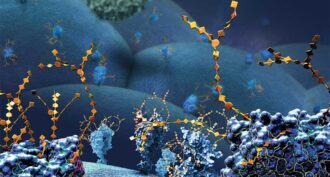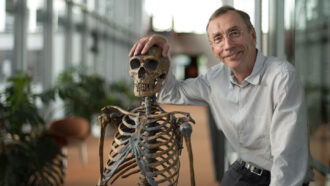All Stories
-
 Animals
AnimalsAward-winning photo captures ‘zombie’ fungus erupting from a fly
The winner of the 2022 BMC Ecology and Evolution photo competition captures the cycle of life and death in the Amazon rainforest in Peru.
-
 Humans
HumansWhat does charred ancient poop reveal about early animal-raising?
Evidence from the dung may push the onset of animal raising back 2,000 years earlier than previously thought.
-
 Genetics
GeneticsFor some kids, their rock-star hair comes naturally
A variant of a gene involved in hair-shaft formation was linked to most of the uncombable-hair-syndrome cases analyzed in a recent study.
By Meghan Rosen -
 Chemistry
ChemistryLego-like way to snap molecules together wins 2022 chemistry Nobel
This so-called ‘click chemistry’ allows scientists to build complex molecules in the lab and in living cells.
By Meghan Rosen and Nikk Ogasa -
 Animals
AnimalsScience is just starting to understand what animals feel
Animal-welfare researchers are studying the feelings and experiences of horses, octopuses and more.
-
 Physics
PhysicsExperiments on ‘entangled’ quantum particles won the physics Nobel Prize
Three pioneers in quantum physics share the 2022 Nobel Prize in physics.
By James R. Riordon and Maria Temming -
 Health & Medicine
Health & MedicineExamining Neandertal and Denisovan DNA wins a 2022 Nobel Prize
Svante Pääbo figured out how to examine the genetic material from these hominid ‘cousins’ of modern humans.
By Tina Hesman Saey and Aimee Cunningham -
 Physics
PhysicsLet’s learn about ‘ghost particles’
Ghostly particles called neutrinos are so lightweight that for a long time, they were thought to have no mass at all.
-
 Animals
AnimalsWatch: This red fox is the first spotted fishing for its food
Big fish in shallow water were easy pickings for this red fox. It’s the first of its species known to fish.
By Freda Kreier -

-
 Tech
TechNASA’s DART spacecraft crashed into an asteroid — on purpose
This mission could provide a blueprint for how to deflect a killer asteroid, if one is ever found headed for Earth.
-
 Animals
AnimalsLiving mysteries: This critter has 38 times more DNA than you do
The genomes of salamanders are bloated with genetic “parasites.” That extra DNA slows down their lives and strands them in perpetual childhood.
By Douglas Fox